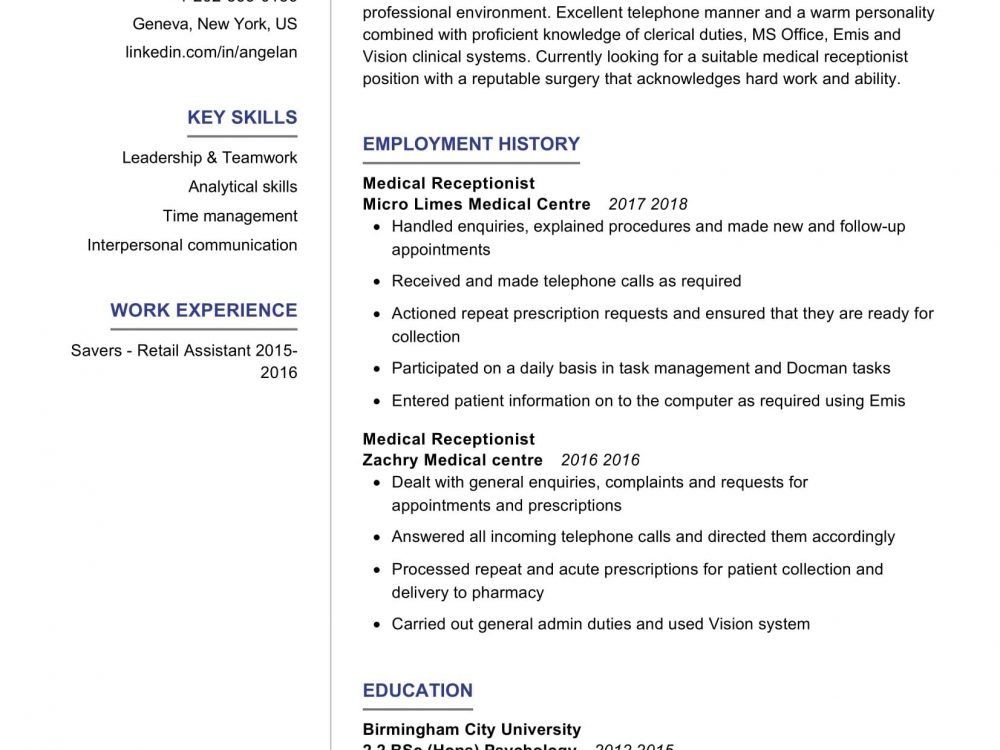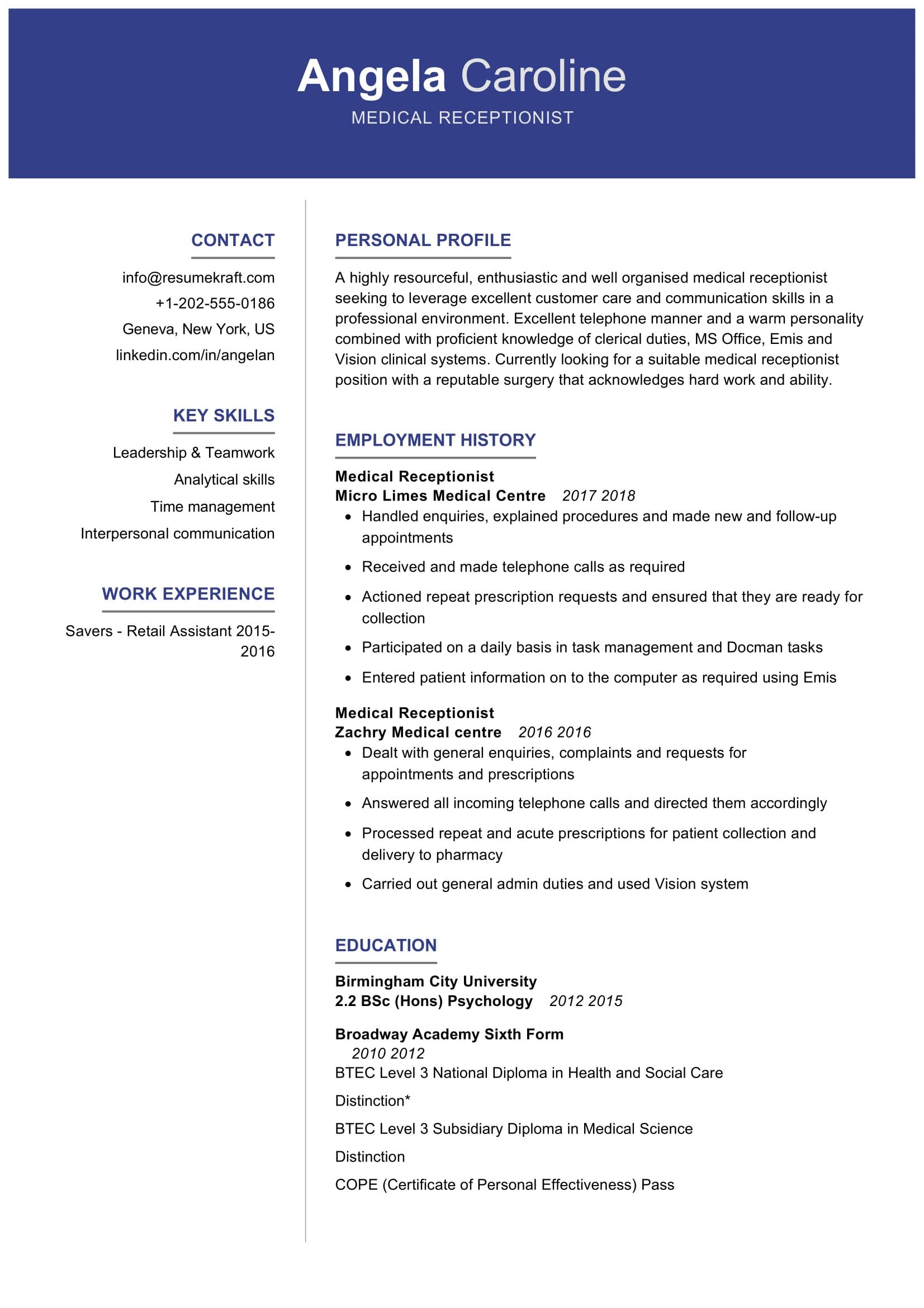Are you a Medical Receptionist by profession and looking for an exciting career? We have good news for you! use our professional Medical Receptionist Resume Sample. You don’t have to start writing from scratch. Just click “Edit Resume” and modify it with your details. Update the template fonts and colors have the best chance of landing your dream job. Find more resume samples.
Medical Receptionist Resume Sample
Angela Caroline
Medical Receptionist
Summary
A highly resourceful, enthusiastic, and well organized medical receptionist seeking to leverage excellent customer care and communication skills in a professional environment. Excellent telephone manner and a warm personality combined with proficient knowledge of clerical duties, MS Office, Emis, and Vision clinical systems. Currently looking for a suitable medical receptionist position with a reputable surgery that acknowledges hard work and ability.
Skills
Work Experience
Medical Receptionist
Micro Limes Medical Centre
- Handled enquiries, explained procedures and made new and follow-up appointments
- Received and made telephone calls as required
- Actioned repeat prescription requests and ensured that they are ready for collection
- Participated on a daily basis in task management and Docman tasks
- Entered patient information on to the computer as required using Emis
Medical Receptionist
Zachry Medical center
- Dealt with general enquiries, complaints and requests for appointments and prescriptions
- Answered all incoming telephone calls and directed them accordingly
- Processed repeat and acute prescriptions for patient collection and delivery to pharmacy
- Carried out general admin duties and used Vision system
Education
Birmingham City University
2.2 BSc (Hons) Psychology
Broadway Academy Sixth Form
BTEC Level 3 National Diploma in Health and Social Care
Distinction*
BTEC Level 3 Subsidiary Diploma in Medical Science
Distinction
COPE (Certificate of Personal Effectiveness) Pass
Languages
- French
- English
- German
- Chines
Career Expert Tips:
- Always make sure you choose the perfect resume format to suit your professional experience.
- Ensure that you know how to write a resume in a way that highlights your competencies.
- Check the expert curated popular good CV and resume examples
Medical Receptionist Resume with Writing Guide
There’s no doubt that the medical field is a competitive arena. After all, when it comes to one of the most in-demand careers in 2018, you’re going up against hordes of doctors and nurses at your local hospital.
In order to stand out from the competition, you have to change up your job hunt strategy – and that means taking a close look at how best to present yourself on paper.
It all starts with the resume, which is your chance to make a first impression. Whether you’re a job-hunter with years of experience or just starting out, there’s no doubt that the perfect medical receptionist resume will help you get the hiring manager’s attention.
Medical Receptionist Resume Writing Guide:
The following is an excellent article by Darlene Wade on the different types of resumes and how to tailor your resume for medical positions. This article has some great tips that will help you write a resume to impress any hiring manager.
- Start with a professional summary. Use this first section to highlight your experience and skills, and to state which job you’re applying for.
- Next, list your skills and experience. Use this section to write about what you have done previously in your field of work. This is one of the most important parts of your resume, as it will give the employer a good idea of what kind of job candidate you are. Be specific with your achievements and use numbers when possible, e.g., “increased sales by 20% in less than 6 months,” or “reduced call volume by more than 20%.”
- You can use the skills section of your resume to highlight what you have learned in the past year and how you can apply that knowledge to the job at hand.
- Start adding your education as soon as possible, especially if you’re applying for a medical position. Focus on your courses and grades, so that the hiring manager can see exactly what type of education you have and how well-rounded your skill set is.
- The last section of the resume is reserved for personal information (e.g. your email address, phone number, and even your social media profiles).
- Be sure to check for spelling, grammar and punctuation mistakes. Your resume is the first thing the hiring manager will see from you. If it has errors, then it’s unlikely that they’ll read any further.
- Make sure you include all relevant information about yourself at the top of your Medical Receptionist Resume . Include any awards, achievements and memberships you’re proud of, along with your contact information.
- Organize the information on your Medical Receptionist Resume in a well-structured format that is easy to read. Use headings and subheadings to make your resume easier for hiring managers to understand.
- Your resume should be no more than one page long, but if you are applying for a medical position then two pages will seem like an appropriate length.
- Be sure to consider the type of job you are applying for when writing your Medical Receptionist Resume . If you’re applying for a job in research, then you should structure your resume based on your skill set. If you’re applying for a more clinical position where you’ll be taking care of patients, then your resume should be tailored accordingly.
- Use accurate, relevant and detailed accounts of past experiences in order to make sure the hiring manager understands how well-qualified you are for the position.
Medical Receptionist Responsibilities:
- Greet patients in a friendly manner.
- Verify insurance coverage for the patient at the time of check-in and verify updated information when changes occur.
- Register patients, or direct them to registration area.
- Collect co-payments, if required, from the patient at the time of check-in and relay co-payment information to the office staff when applicable.
- Take vital signs, including temperature, pulse, respiration rate, blood pressure and weight when appropriate.
- Collect payment from patients at the time of checkout and issue receipts to patients as needed.
- Explain patient charges to patients.
- Assist with special procedures (e.g., x-rays) at the reception desk when trained or directed to do so by the office staff.
- Coordinate with office staff to provide customer service, including scheduling appointments, verifying insurance benefits and collecting co-payments.
- Schedule appointments for patients and confirm appointments with patients by phone or in person.
- Prepare reports and documents as required, such as claim forms.
- Maintain confidentiality of patient information, adhering to HIPAA regulations when applicable.
Top 10 Must-have Medical Receptionist Skills:
- Excellent written and verbal communication skills.
- The ability to work with minimal supervision as you are responsible for controlling of the workflow of the office.
- A highly developed efficiency and organizational skill set to increase the effectiveness of workflow management in the workplace.
- High level of computer literacy necessary as medical receptionists are constantly inputting, storing, processing and retrieving patient information at a rapid pace; knowledge of software programs such as Microsoft Outlook, Access & Excel is useful when working in a medical setting..
- Ability to balance many tasks at once, multitasking is an important skill for medical receptionist. You have to navigate phone calls, faxed messages and emails while fielding questions from patients and doctors.
- Flexibility – the ability to adapt quickly to a changing environment and be able to communicate effectively with individuals of different personality types.
- Ability to empathize with patients and families and the ability to respond effectively to their needs.
- Ability to communicate effectively with hospital staff members while being attentive to their busy schedules.
- Ability to properly convey and explain sensitive messages and information to patients, doctors, office staff and administration in a respectful manner.
- Working knowledge of proper record keeping including state regulations, coding for insurance purposes & confidentiality safeguards.
Tips to write a Medical Receptionist Resume Summary:
- Include your educational qualification, skill set, work experience and achievements.
- Include a brief description of your skills, job duties and responsibilities you handled.
- Include necessary job related information and highlight only those that are relevant to the job you are applying for.
- Highlight some of your key qualifications relating to the potential employer’s needs.
- When writing a Medical Receptionist Resume Summary, use positive and active verb and phrases like resolve problems, analyze issues, identify opportunities etc.
How to write a Medical Receptionist Resume with No experience:
- If you are just graduating from high school and have no related experience, start by writing a career objective. This will help you define what it is that you want to do in the healthcare field. It should be a statement of your professional goals and reflect your personal and educational background.
- Next, develop an education section. If you do have a university degree, write a short paragraph explaining your educational background, including your degree or certificate and any honors or prizes that you may have received. Include the name of the college and institution name and/or city in which you attended college as well as the term or dates of attendance.
- Develop an experience section to highlight any relevant experience, even if limited. Include a series of brief job summaries (or descriptions) that highlight your duties and accomplishments. If you worked for a company, include the name of the company, the location and your position title and/or description. Each job description should be a separate bullet point, not an entire paragraph.
- Develop an additional skills section by writing one or two sentences about relevant skills for the medical receptionist position you are applying for.
How to write a Medical Receptionist Cover Letter:
- Do your research. If you re not sure of the job title, company name or industry in which you are applying for a position, do some research. Google the job posting to gain an idea of what the role entails and how you can expand your knowledge and skills for the role.
- Write a targeted cover letter. Make sure that your cover letter is written in a professional manner and targeted directly to the HR manager at the organization. Your cover letter should be customized for the position you are applying to, so note the name of the organization, job title and company.
- Mention your most relevant skills and why they are important. Include any evidence that demonstrates your potential for performing in this role – past experience, publications, presentations etc., that will highlight your expertise in this field
- Include a call to action in case there is an opportunity for a follow-up conversation about your application or when you wish to have additional information about the role or organization
- Make sure that your cover letter is short and to the point. No more than one page is required.
- Write a targeted cover letter. Make sure that your cover letter is written in a professional manner and targeted directly to the HR manager at the organization. Your cover letter should be customized for the position you are applying to, so note the name of the organization, job title and company.
Key Takeaways:
- Key words are important in any resume and a medical receptionist should include them.
- There are some medical receptionist job skills that are important for both resumes and cover letters.
- A sample resume is included as a guide for the reader/writer.


